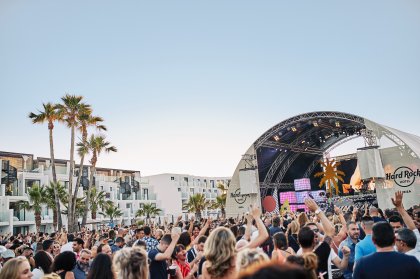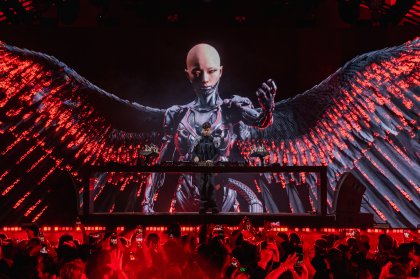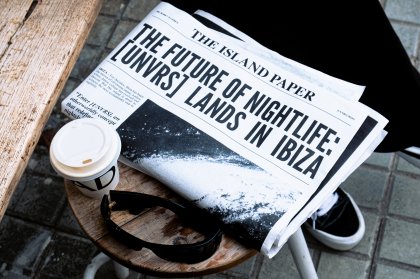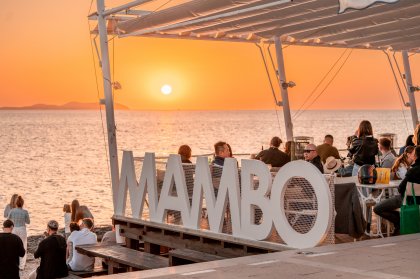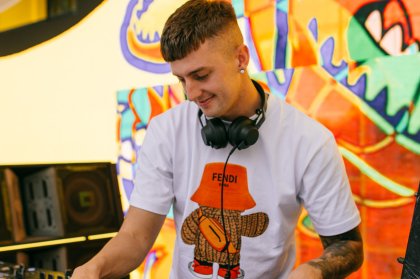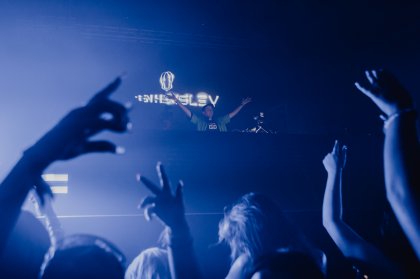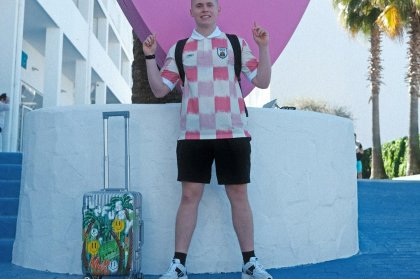Yes, we know, it does not look like we can be serious in a setting like this, but someone has to do it. Besides, we are actually inside, most of the time. Whether you are a music geek or not, if you enjoy dance music pay mind to what goes on here. What happens behind the scenes backstage directly affects your experience of the party, festival or streamed track you so love.
While several conferences throughout the year address the issues surrounding the industry, the International Music Summit (IMS) in Ibiza holds a special place. Considered by many to be the party capital of the planet, the island is like the mothership calling everyone home.
It was not always like this. As IMS comes of age, a long way from their first summit ten years ago, lots has happened: to them, to the rest of us and to the industry, as to the young genre of electronic music. The conference falls halfway between the Winter Music Conference in Miami (WMC) in March and the Amsterdam Dance Event (ADE) in Amsterdam in October to keep alive the conversation.
The second day of the IMS - which would have actually been the first had a bonus day not been added on Tuesday - made it difficult to choose, but if we were to sum it up for you, here are some of the most inspiring and powerful moments of the day, in order of appearance.
IMS Business Report
 Well, money talks come first. The annual leading industry study, the IMS Business Report had some interesting and telling statistics on the industry once again this year. So here goes.
Well, money talks come first. The annual leading industry study, the IMS Business Report had some interesting and telling statistics on the industry once again this year. So here goes.
The global electronic music industry value is up 3% to $7.4 billion. However, the earnings of the top 12 DJs have fallen by a whopping 1% in 2016, now down to $300m*, with Calvin Harris leading the way with $63m a year, followed by Tiesto at $38m and Guetta at $28m. The most popular DJs on social media are still Martin Garrix, Skrillex and Hardwell, all of whom are growing their followers 11x faster on Instagram than on Facebook.
For the ten year anniversary, the report also compared last year with 2007. As it turns out, half of the DJs are now younger than 30, as opposed to none ten years ago. Two Ibiza venues remain in the DJ Mag Top 10, and three leading festivals across the globe have quintupled their combined capacity since 2008, with global participation going from 185k to 925k people. Also, since 2007 DJ Gear sales have grown at twice the rate of guitar sales (in the U.S.), and by the way, techno remains the best selling genre on Beatport.
For all details, download the full business report here.
Health vs. Hedonism
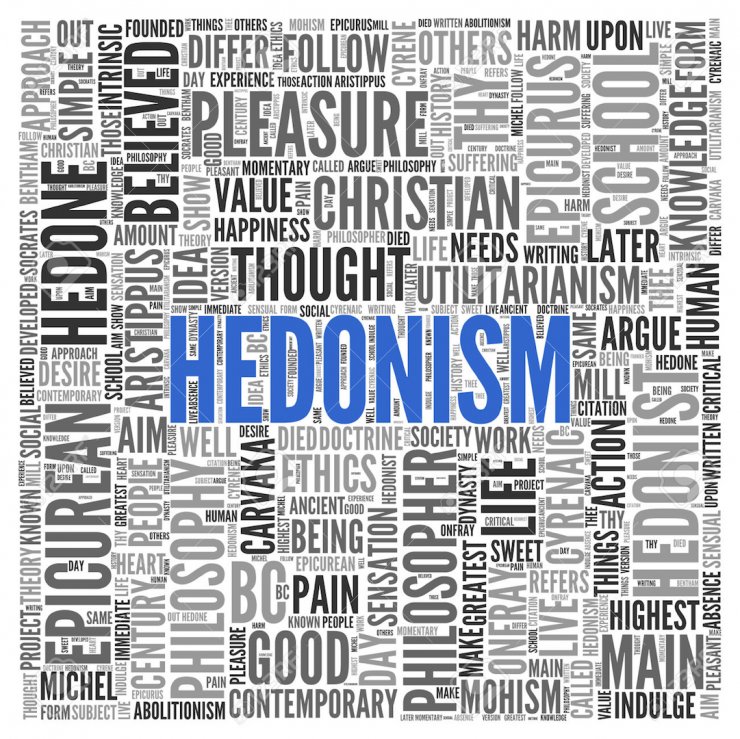 Among the biggest issues in the industry is the tension between hedonism and health. One of the panels discussed the ways in which, perhaps, we can have our cake and eat it, too.
Among the biggest issues in the industry is the tension between hedonism and health. One of the panels discussed the ways in which, perhaps, we can have our cake and eat it, too.
Artists Agoria and Louisahhh, as well as head of artist relations for Native Instruments Andreas Allen, BBC Radio 1 radio presenter Monki and other industry leaders discussed how to deal with long hours, nighttime schedules, creative pressure and round-the-clock work stress, all fundamental parts of the lives of anyone working in this industry. This scenario takes places in a workplace where people actually get offended if one does not partake in the festivities and indulgement - the hedonism - of those who merely party (rather than work) in these circles. And, just to be clear, hedonistic indulgence definitely includes digital and work addictions also qualify. .

The panel explored ways to deal with this predicament. After all, health and well-being contribute to maintaining a career in the first place. Yet as a hobby or passion turns into a job or career, inevitable conflicts arise. These end up interfering with the whole point of pursuing one's passion as a living in the first place.
The panellists offered several options as to how to deal with the dichotomy, including advice from business psychologist and performance coach Rachel Turner. Her career came about after having had her own hedonistic indulgences in the 1990s, something many of the panellists could relate to. Although many of the ways to succeed physically, mentally and emotionally are personal to each individual, she had several general suggestions to help industry members strike that fine line and live in balance. Many of the artists on the panel shared their own personal methods for staying on top of the game.
In general, sleeping patterns, daily health practices and routines help. To stay healthy, keep your thoughts positive, create powerful habits and find your wonder. As Sébastien Devaud aka Agoria pointed out, we live in a society of pleasure in which we are all addicts, all running around constantly looking for the next fix. Rachel also advises thinking about three things she/one would teach her/one's younger self.
Keynote Interview: The Black Madonna
One such person is euphoric DJ and phenomenon for change, Marea Stamper aka The Black Madonna, the first keynote interview. Born and raised in rural Kentucky into a family of musicians and music lovers, she told of her rise to fame, from over two decades of obscurity to being Mixmag's DJ of the Year in 2016, with some seriously funny anecdotes as well as heartfelt issues.
She went from being a lifelong raver to a professional DJ in that glorious period of massive events in the Midwest circuit between 1992 to 1996. Those days major artists the likes of Aphex Twin
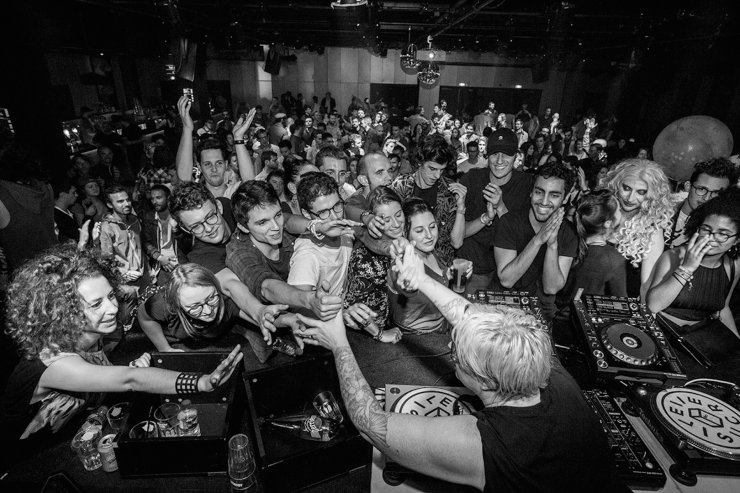 would casually stop in, before the prohibitive legislation that started applying crackhouse laws to raves in the U.S.
would casually stop in, before the prohibitive legislation that started applying crackhouse laws to raves in the U.S.
At the time, the events survived because authorities had no idea what was going on, events with line-ups that today would cost $100+. She told of a 16-year-old Marea - picture braces and blue hair, a high school dropout and all - who was in charge of overseeing what was actually an open-air rave but calling it "a picnic of an electronic music convention for which artists and academics have flown in from all over the world" rather than another version of the truth: 3,000 kids on acid in a field. For six months stories like these worked, up until people started being sent to jail. She started DJing at the end of that period - not easy times.
That's the side we expect from an artist. But after going to college to become a lawyer, as a screaming hysterical democrat with her liberal fantasies, she got called to Chicago signing vinyl only catalogues to digital in a burgeoning company. This included signing Deadmau5. It was a new frontier at the time, as well as amazing training for the level of knowledge and understanding of industry she has now. Not to mention it was the perfect job for the, in her words, 'record nerd' that she was.
She was called to reinvigorate and reimagine the Smartbar in Chicago. The goal was to create a resident-focused club, reclaiming the progenitor of house music - where Depeche Mode, industrial music and all that came before house when the music was actually played in warehouses, or plainly house before it became self-aware. What made Chicago house great was the collision of all these things. She wanted that to happen at Smartbar.
 As dance music became self-aware, the topic shifted to diversity such as gender, race, sexuality and class. Despite the progression of dance music, one look at the top 100 lists reveals that at the end of the year there were more men with women's names than actual women. Is it a coincidence? Doesn't seem like it. Something about the mechanics of our culture makes some people more likely to succeed. For many reasons, things simply work that way. It would be easy to get lost in the ideology of the matter, but it is simply the case, she continued.
As dance music became self-aware, the topic shifted to diversity such as gender, race, sexuality and class. Despite the progression of dance music, one look at the top 100 lists reveals that at the end of the year there were more men with women's names than actual women. Is it a coincidence? Doesn't seem like it. Something about the mechanics of our culture makes some people more likely to succeed. For many reasons, things simply work that way. It would be easy to get lost in the ideology of the matter, but it is simply the case, she continued.
Marea DJed for over 20 years without making more than $100 per set. Fighting economic hardships, gendered expectations and more, she is now acknowledging it, calling attention to the fact that this sort of discrimination is no longer a debatable fact. It is not about whether women/trans/black people are or are not facing these issues. We are so far past whether the issue exists or not that we are wasting our time and elevating a point of view that is so meritless that it shouldn't even reach the discussion. The question is not if these issues exist but what to do next. The stereotypes and assumptions of music production of gender inequality run deep across gender lines.
"We're not going to get to the moon unless we point the rocket and set fire."
Equity between sexes, races and cultures needs to be balanced. Women can only do so much. It is up to everyone, which includes men of course, to challenge beliefs inside ourselves. This, as she reminded us, doesn't mean anyone is bad but merely that that's where we come from. We must look deep inside. Everyone has to talk to one other, make it a priority and co-sign on this.
Meet team elrow and the Arnau Family

One group of people that appears to have this down pat is the Arnau family - and for over six generations, too. Not everyone may know the full story behind one of the most popular parties on the planet, elrow, the fruit of multiple generations of this family.
The latest descendent Juan Arnau told of the incredible parties thrown for over 150+ years. With a massive family tree on the screen, tracing the story back to 1870, their experience with the party industry begins when the two main competitors, his great-great-grandfather and great-great-grandmother married and joined forces. A few generations later, the family chased raves around Europe to convince DJs to play in Spain, not the most popular destination at the time. As some may remember, until the end of the 80s, DJs were not known figures.
To this day, the grandfather, as did previous generations, listens to the sets and always asks how good the party was and whether people had fun rather than how much money they earned. That is part of the philosophy of the family: it is all about passion, not money. First do things perfectly; then money will come. Their magic formula is I + T = S (Innovate + Transgress = Surprise).
Today elrow has 18 themes or versions of the party and 2017 is a new era for the brand. With 132 shows, 1.7M attendees, 74 clubs, 24 festivals in 21 countries and 62 cities, the brand is ready to return to Ibiza this summer. In fact, it has been preparing for Amnesia since last January.
To the question of why Amnesia next on Ibiza, Juan responded that it is the most iconic club on the island with the perfect dimensions. Both the terrace and main room will be perfect for the show. It is not a secret that elrow has entered into an investment agreement with Superstruct Entertainment backed by Providence Equity Partners and James Barton, the founder of Creamfields, who has been in the industry forever. Lots in store.
There's more, much more, of course. Have a look here at what is coming up tomorrow.

